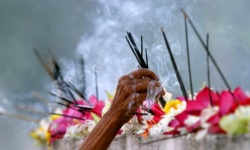Gandha
gandha : [m.] odour; smell; scent.
Source
gandha
香・乾陀 (Skt, Pali; Jpn ko or kenda )
Incense, smell, scent, odor, or perfume. Gandha constituted important offerings to the Buddha and the Buddhist Order along with such offerings as pushpa (flowers) and dipa (lamps). In ancient India, incense had a variety of customary uses: as a deodorant that was rubbed on the body, as a room freshener, and used to scent clothing, etc. Incense was produced from sandalwood, aloes wood, wood from other aromatic trees, and from flowers such as kunkuma (saffron). The "Teacher of the Law" (tenth) chapter of the Lotus Sutra reads: "If there are persons who embrace, read, recite, expound, and copy the Lotus Sutra of the Wonderful Law, even only one verse, and look upon this sutra with the same reverence as they would the Buddha, presenting various offerings of flowers, incense, powdered incense incense for burning, silken canopies, streamers and banners, clothing and music, and pressing their palms together in reverence, then, Medicine King, you should understand that such persons have already offered alms to a hundred thousand million Buddhas and in the place of the Buddhas have fulfilled their great vow, and because they take pity on living beings they have been born in this human world." The word gandha is an element of a number of Sanskrit Buddhist terms and proper names. For example, the Wisdom sutras describe Gandhavati, City of Fragrances, as the place where Bodhisattva Dharmodgata preached on the perfection of wisdom. Gandhamadana, Mount Fragrant, is said to lie to the north of the Snow Mountains in Jambudvipa. The trees on this mountain are said to give off a beautiful fragrance. Gandhakuti, hall of fragrance, means a room where the Buddha dwells. Tamalapattra-chandana-gandha, or Tamalapattra Sandalwood Fragrance, is the name Maudgalyayana will have as a Buddha in a future life according to a prediction in the Lotus Sutra. Gods of music called gandharva, one of the eight kinds of nonhuman beings who protect Buddhism, are said to subsist on gandha, or fragrance.
